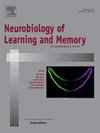去其糟粕,取其精华:人类增强灭绝学习回顾。
IF 1.8
4区 心理学
Q3 BEHAVIORAL SCIENCES
引用次数: 0
摘要
治疗焦虑相关疾病的几种主要疗法都依赖于消退学习原理。然而,尽管经过了数十年的发展和研究,这些疗法中的许多疗法仍然只是中等程度的有效。开发改善消退学习的技术,是朝着开发更好的、基于机理的暴露疗法迈出的重要一步。在这篇综述中,我们将重点介绍有关通过奖赏神经回路和多巴胺能通路增强消退学习策略的人类研究,重点是反条件反射和其他行为增强形式的消退学习(如新奇感促进消退、积极情绪训练)。我们还重点介绍了新出现的增强消退的药物和非药物方法,包括 L-DOPA 和有氧运动。最后,我们讨论了增强消退学习和记忆研究的未来方向,包括需要开展更多工作来研究个体差异和精神病理学的影响。本文章由计算机程序翻译,如有差异,请以英文原文为准。
Out with the bad, in with the good: A review on augmented extinction learning in humans
Several leading therapies for anxiety-related disorders rely on the principles of extinction learning. However, despite decades of development and research, many of these treatments remain only moderately effective. Developing techniques to improve extinction learning is an important step towards developing improved and mechanistically-informed exposure-based therapies. In this review, we highlight human research on strategies that might augment extinction learning through reward neurocircuitry and dopaminergic pathways, with an emphasis on counterconditioning and other behaviorally-augmented forms of extinction learning (e.g., novelty-facilitated extinction, positive affect training). We also highlight emerging pharmacological and non-pharmacological methods of augmenting extinction, including L-DOPA and aerobic exercise. Finally, we discuss future directions for augmented extinction learning and memory research, including the need for more work examining the influence of individual differences and psychopathology.
求助全文
通过发布文献求助,成功后即可免费获取论文全文。
去求助
来源期刊
CiteScore
5.10
自引率
7.40%
发文量
77
审稿时长
12.6 weeks
期刊介绍:
Neurobiology of Learning and Memory publishes articles examining the neurobiological mechanisms underlying learning and memory at all levels of analysis ranging from molecular biology to synaptic and neural plasticity and behavior. We are especially interested in manuscripts that examine the neural circuits and molecular mechanisms underlying learning, memory and plasticity in both experimental animals and human subjects.

 求助内容:
求助内容: 应助结果提醒方式:
应助结果提醒方式:


